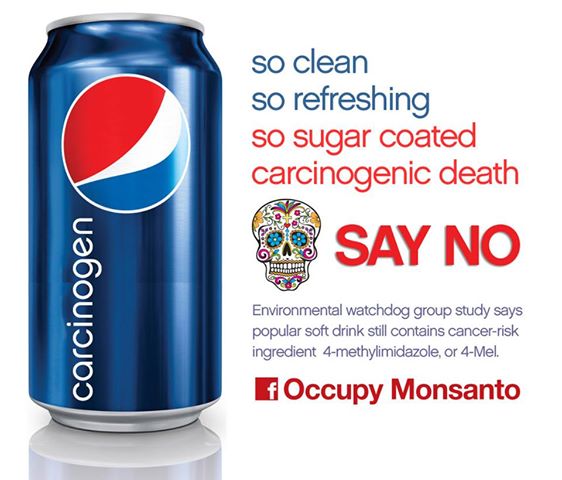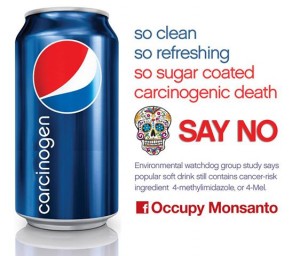In Canada we call it pop but in the U.S. it is called soda, that carbonated beverage that is as ubiquitous as milk and juice. And in the world of sodas I am considered a Diet Coke aficionado. The enemy of Coke lovers is Pepsi and when I read this article last month I couldn’t help but go “aha, now I know why I don’t drink that infernal cola upstart.”
It seems that Pepsi has been using a coloring agent, 4-methylimidazole (4-Mel) which is a known carcinogen. It wasn’t until California changed product labeling disclosure requirements for cancer-causing agents that Pepsi acknowledged its use of 4-Mel. The company immediately removed the chemical from its California bottlers and plans to have it out of Pepsi in the U.S. by February 2014. My question is why isn’t it out of all Pepsi product formulations globally? What are the advantages of having 4-Mel, linked to cancer in any product sold anywhere?
Not to be too smug about it all it turns out the Coke also uses 4-Mel as a coloring agent but Coca Cola has already removed it from its formula for all U.S. bottling plants. So what’s stopping Pepsi from getting this done sooner? And what’s stopping both companies from removing 4-Mel from their formulas globally? Both have announced global plans to remove 4-Mel but no definitive timetable.
To those of you who are foresworn to never drink either product again, the U.S. Food and Drug Administration stated you would have to drink more than 1,000 cans of soda daily to get to the dosage levels used in cancer studies done with mice and rats.
Coke and Pepsi account for almost 90% of all soda consumed in the United States and both have watched their sales decline steadily throughout the last decade.











This may be a bit of a red herring since the biggest health risk in drinking soda pop is amount of sugar present which drives the development of obesity and the metabolic syndrome (diabetes, heart disease etc.)
Hi Duane, There’s lots of reasons to point out that sugar-based drinks are a contributing factor to obesity and heart disease. I agree that this is an important medical health issue but a known carcinogen that is used to produce the caramel colour in colas is probably something all of us soda drinkers don’t need to have in addition to the sugar. I cut out regular soda a long time ago and drink diet drinks and I know that aspartame has attendant risks as well but at least I am not ingesting useless calories from a drink that is largely flavoured carbonated water.
Fair enough, Len.
It begs the question of how many other nasty surprises like this lurk in industrial foods.
Hi Duane, I think that most companies who have been using traditional formulae in their products will receive nasty surprises in the future as more and more consumer testing is done. This is one of the challenges of the 21st century, sorting out what we have been putting in our highly processed, manufactured food.